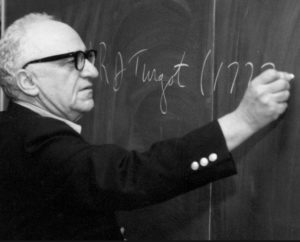[Editor’s note: In this article, originally published in October 1984, Murray Rothbard critiques a problem with the economics of Republicans and conservatives. Namely, its proponents think they can have it both ways by cutting tax rates and increasing government spending, while somehow not running up huge deficits. Much of this is based on the so-called Laffer curve idea, which Rothbard regards with skepticism. Moreover, Rothbard notes that when most conservatives speak of “the gold standard” they mean a government regulated standard which is an ersatz version of the real thing. At the core of it all is a refusal to do anything at all about the enormous American welfare state. At the time, this sort of thing was called “supply-side economics.” Unfortunately, we
Read More »Articles by Murray N. Rothbard
Victory Is Our Goal
October 14, 2024[This article is adapted from Murray Rothbard’s 1977 keynote address to the Libertarian Party.]I used to think that adopting the victory of liberty as the overriding goal must be almost self-evident to all libertarians — until I began to find those who turned pale and fled when the word “victory” was mentioned. For there are all too many libertarians who apparently believe that the point of the whole enterprise is not triumph in the real world, but all sorts of other motivations, ranging from contemplating the beautiful intellectual edifice of the libertarian system to selling each other dried beans to bearing moral witness to the rightness or righteousness of the libertarian worldview.There is, I suppose, a certain satisfaction in knowing, or even proclaiming,
Read More »How westward expansion sowed the seeds of the Civil War
July 25, 2024[Editor’s note: The article below is adapted from a lengthy 1954 memo by Rothbard which is written largely as a review of George B. DeHuszar and Thomas Hulbert Stevenson’s A History of the American Republic. The memo was republished in 2010 by the Mises Institute as part of Strictly Confidential: The Private Volker Fund Memos of Murray N. Rothbard, edited by David Gordon. Rothbard here provides a concise and razor-sharp analysis of how the Mexican-American war and westward expansion laid the foundation for the American Civil War. Rothbard notes that the vast new territories in the West animated new and aggressive efforts by both pro-slavery and anti-slavery interest groups who sought to dominate the new territories. Rothbard blames, among other factors, the
Read More »Rothbard in 1972: Another Lone Nut?
July 17, 2024This first appeared in The Libertarian Forum, Vol VI, NO.6-7, June-July,1972, following the attempted assassination of Presidential candidate George Wallace.John F. Kennedy; Malcolm X; Martin Luther King; Robert F. Kennedy; and now George Corley Wallace: the litany of political assassinations and attempts in the last decade rolls on. (And we might add: General Edwin Walker, and George Lincoln Rockwell. In each of these atrocities, we are fed with a line of cant from the liberals and from the Establishment media. In the first place, every one of these assassinations is supposed to have been performed, must have been performed, by “one lone nut” – to which we can add the one lone nut who murdered Lee Harvey Oswald in the prison basement. One loner, a twisted psycho,
Read More »The First French Communists: The Conspiracy of the Equals
June 17, 2024[This article is excerpted from An Austrian Perspective on the History of Economic Thought (1995), volume 2, chapter 9: “Roots of Marxism: Messianic Communism,” section 3, “The Conspiracy of the Equals.” Inspired by the works of Mably and especially Morelly, a young journalist from Picardy decided, amidst the turmoil of the French Revolution, to found a conspiratorial revolutionary organization to establish communism. Strategically, this was an advance on the two founders, who had had no idea but simple education of how to achieve their goal. François Noël (”Caius Gracchus”) Babeuf (1764–1797), a journalist and commissioner of land deeds in Picardy, came to Paris in 1790, and imbibed the heady revolutionary atmosphere. By 1793, Babeuf was committed to economic
Read More »The Twilight of the Antifederalists
March 16, 2024New York was the toughest nut for the Federalists to crack. For here was one state where not only was the population overwhelmingly opposed to the Constitution, but the opposition was also in firm and determined control of the state government and the state political machinery. Here was a powerful governor, George Clinton, who would not, like Hancock and Randolph in the other critical states, yield to a sellout under pressure. Clinton had been a highly popular governor since the formation of the state, had a strong political machinery based on the mass of upstate yeomanry, and was determined to organize and defeat the Constitution.Still, their final organization was sluggish. It was only in February 1788 that the Albany Antifederalists, guided by Clinton, formed a
Read More »The Myth of Democratic Socialism
February 29, 2024Originally published September 1977 in Libertarian Review.In any debate between a socialist and a free-market capitalist, all too often the socialist quickly puts the free-market advocate on the defensive, and the entire time is consumed by the free-market person fending off attacks on the ability of the market to prevent inequality, or business cycles, or even the ravages of affluence and "materialism." Being on the offensive, socialism emerges spotless and unbesmirched, and it is implicitly assumed on all sides that the market economy must prove its worthiness to be in the same moral and ideological ballpark as socialism. In fact, the morality of socialism is rarely questioned in these discussions, the critic confining himself to doubts about socialism’s
Read More »War Guilt in the Middle East
February 26, 2024[A selection from Left and Right: A Journal of Libertarian Thought, Spring-Autumn 1967.]
The chronic Middle East crisis goes back – as do many crises – to World War I. The British, in return for mobilizing the Arab peoples against their oppressors of imperial Turkey, promised the Arabs their independence when the war was over. But, at the same time, the British government, with characteristic double-dealing, was promising Arab Palestine as a “National Home” for organized Zionism. These promises were not on the same moral plane: for in the former case, the Arabs were being promised their own land freed from Turkish domination; and in the latter, world Zionism was being promised a land most emphatically not its own. When World War I was over, the British
How the American Revolution Turned North American Foreign Trade on Its Head
December 30, 2023[Chapter 1 of Rothbard’s newly edited and released Conceived in Liberty, vol. 5: The New Republic: 1784–1791.]
After peace came in 1783, the new republic faced a two-fold economic adjustment: to peacetime from the artificial production and trade patterns during the war, and to a far different trading picture than had existed before the war. The largest change between the two eras of peace was the shift in trading patterns resulting from independence. Most importantly, while Americans were freed from the shackles of British mercantilism and could trade freely with the rest of the world, the United States was now a foreign country that could no longer freely enjoy a market within the British Empire.
While the bulk of America’s trade remained with the British Empire,
Is This America? Cops, Criminals and the Bombing of Philadelphia
November 13, 2023This article was originally published in Libertarian Outlook (vol. 1, no 1, August 1985). This was the only issue of the magazine that was ever published. Permission was granted by Eric Garris, one of the original coeditors, to reprint this article on mises.org.
Libertarians have devoted so much time and energy to the important cause of repealing laws against victimless “crimes” that we have tended to neglect an equally important social problem: crimes with victims, i.e., genuine crime. Our neglect has scarcely been matched by that of the American people, who have rightly put concern and horror at “street crime” near the top of their political agenda. It is also beside the point for Ralph Nadar and his colleagues to wail about the public’s relative indifference
Ten Great Economic Myths
September 9, 2023Our country is beset by a large number of economic myths that distort public thinking on important problems and lead us to accept unsound and dangerous government policies. Here are ten of the most dangerous of these myths and an analysis of what is wrong with them.
Myth #1
Deficits are the cause of inflation; deficits have nothing to do with inflation.
In recent decades we always have had federal deficits. The invariable response of the party out of power, whichever it may be, is to denounce those deficits as being the cause of our chronic inflation. And the invariable response of whatever party is in power has been to claim that deficits have nothing to do with inflation. Both opposing statements are myths.
Deficits mean that the federal government is spending
Mercantilism: A Lesson for Our Times?
July 15, 2023Mercantilism has had a "good press" in recent decades, in contrast to 19th-century opinion. In the days of Adam Smith and the classical economists, mercantilism was properly regarded as a blend of economic fallacy and state creation of special privilege. But in our century, the general view of mercantilism has changed drastically: Keynesians hail mercantilists as prefiguring their own economic insights; Marxists, constitutionally unable to distinguish between free enterprise and special privilege, hail mercantilism as a "progressive" step in the historical development of capitalism; socialists and interventionists salute mercantilism as anticipating modern state building and central planning.
Mercantilism, which reached its height in the Europe of the 17th and
The Whiskey Rebellion: A Model for Our Time?
June 3, 2023The Free Market 12, no. 9 (September 1994)
In recent years, Americans have been subjected to a concerted assault upon their national symbols, holidays, and anniversaries. Washington’s Birthday has been forgotten, and Christopher Columbus has been denigrated as an evil Euro-White male, while new and obscure anniversary celebrations have been foisted upon us. New heroes have been manufactured to represent "oppressed groups" and paraded before us for our titillation.
There is nothing wrong, however, with the process of uncovering important and buried facts about our past. In particular, there is one widespread group of the oppressed that are still and increasingly denigrated and scorned: the hapless American taxpayer.
This year is the bicentenary of an important
The Lure of a Stable Price Level
May 28, 2023One of the reasons that most economists of the 1920s did not recognize the existence of an inflationary problem was the widespread adoption of a stable price level as the goal and criterion for monetary policy. The extent to which the Federal Reserve authorities were guided by a desire to keep the price level stable has been a matter of considerable controversy. Far less controversial is the fact that more and more economists came to consider a stable price level as the major goal of monetary policy. The fact that general prices were more or less stable during the 1920s told most economists that there was no inflationary threat, and therefore the events of the Great Depression caught them completely unaware.
Actually, bank-credit expansion creates its mischievous
Rothbard: Essentials of Money and Inflation
May 20, 2023Money is a crucial command post of any economy, and therefore of any society. Society rests upon a network of voluntary exchanges, also known as the “free-market economy”; these exchanges imply a division of labor in society, in which producers of eggs, nails, horses, lumber, and immaterial services such as teaching, medical care, and concerts, exchange their goods for the goods of others. At each step of the way, every participant in exchange benefits immeasurably, for if everyone were forced to be self-sufficient, those few who managed to survive would be reduced to a pitiful standard of living.
Direct exchange of goods and services, also known as “barter,” is hopelessly unproductive beyond the most primitive level, and indeed every “primitive” tribe soon found
The Brutality of Slavery
May 13, 2023[This article is excerpted from Conceived in Liberty, volume 1, chapter 6, "The Social Structure of Virginia: Bondservants and Slaves". An MP3 audio file of this article, narrated by Floy Lilley, is available for download.]
Until the 1670s, the bulk of forced labor in Virginia was indentured service (largely white, but some Negro); Negro slavery was negligible. In 1683 there were 12,000 indentured servants in Virginia and only 3,000 slaves of a total population of 44,000. Masters generally preferred bondservants for two reasons. First, they could exploit the bondservants more ruthlessly because they did not own them permanently, as they did their slaves; on the other hand, the slaves were completely their owners’ capital and hence the masters were economically
The Progressive Era and the Family
May 6, 2023[Originally from Joseph R. Peden and Fred R. Glahe, eds., The American Family and the State (San Francisco: Pacific Research Institute, 1986).]
While the "Progressive Era" used to be narrowly designated as the period 1900–1914, historians now realize that the period is really much broader, stretching from the latter decades of the nineteenth century into the early 1920s. The broader period marks an era in which the entire American polity—from economics to urban planning to medicine to social work to the licensing of professions to the ideology of intellectuals—was transformed from a roughly laissez-faire system based on individual rights to one of state planning and control. In the sphere of public policy issues closely related to the life of the family, most of
Chapter 34: Exchange Controls
May 4, 2023Starting in January of 1967, Rothbard churned out fifty-eight columns, the last one written in the summer of 1968. In those two crucial years, there was, as they say, never a dull moment.
Narrated by Jim Vann.
[embedded content]
Tags: Featured,newsletter
Read More »Chapter 40: The Escalation of Lyndon Johnson
May 4, 2023Starting in January of 1967, Rothbard churned out fifty-eight columns, the last one written in the summer of 1968. In those two crucial years, there was, as they say, never a dull moment.
Narrated by Jim Vann.
[embedded content]
Tags: Featured,newsletter
Read More »Never a Dull Moment: A Libertarian Look at the Sixties Audiobook
May 4, 2023These short columns—usually no more than two typewritten pages each—appeared in the Freedom Newspapers. Starting in January of 1967, Rothbard churned out fifty-eight columns, the last one written in the summer of 1968, addressing the campus revolt; the massive antiwar demonstrations; the Six-Day War between Israel and the Arab powers; the Newark riots; the Vietnam war; the persecution of H. Rap Brown, the assassination of Martin Luther King, the abdication of Lyndon Baines Johnson, the rise of Richard Nixon — in those two crucial years there was, as they say, never a dull moment.
Read the text version here. Narrated by Jim Vann.
Download the complete audiobook (63 MP3 files) in one ZIP file here. This audiobook is also available on Apple Podcasts, Spotify,
Chapter 25: A New Constitution?
May 4, 2023Starting in January of 1967, Rothbard churned out fifty-eight columns, the last one written in the summer of 1968. In those two crucial years, there was, as they say, never a dull moment.
Narrated by Jim Vann.
[embedded content]
Tags: Featured,newsletter
Read More »Chapter 15: Civil War in July, 1967 — Part II
May 4, 2023Starting in January of 1967, Rothbard churned out fifty-eight columns, the last one written in the summer of 1968. In those two crucial years, there was, as they say, never a dull moment.
Narrated by Jim Vann.
[embedded content]
Tags: Featured,newsletter
Read More »Chapter 20: Abolish Slavery! — Part VII
May 4, 2023Starting in January of 1967, Rothbard churned out fifty-eight columns, the last one written in the summer of 1968. In those two crucial years, there was, as they say, never a dull moment.
Narrated by Jim Vann.
[embedded content]
Tags: Featured,newsletter
Read More »Chapter 31: Jim Garrison, Libertarian
May 4, 2023Starting in January of 1967, Rothbard churned out fifty-eight columns, the last one written in the summer of 1968. In those two crucial years, there was, as they say, never a dull moment.
Narrated by Jim Vann.
[embedded content]
Tags: Featured,newsletter
Read More »Chapter 12: “Rebellion” in Newark
May 4, 2023Starting in January of 1967, Rothbard churned out fifty-eight columns, the last one written in the summer of 1968. In those two crucial years, there was, as they say, never a dull moment.
Narrated by Jim Vann.
[embedded content]
Tags: Featured,newsletter
Read More »Chapter 23: Gun Laws
May 4, 2023Starting in January of 1967, Rothbard churned out fifty-eight columns, the last one written in the summer of 1968. In those two crucial years, there was, as they say, never a dull moment.
Narrated by Jim Vann.
[embedded content]
Tags: Featured,newsletter
Read More »Chapter 26: The Elections
May 4, 2023Starting in January of 1967, Rothbard churned out fifty-eight columns, the last one written in the summer of 1968. In those two crucial years, there was, as they say, never a dull moment.
Narrated by Jim Vann.
[embedded content]
Tags: Featured,newsletter
Read More »Chapter 22: “Incitement” to Riot
May 4, 2023Starting in January of 1967, Rothbard churned out fifty-eight columns, the last one written in the summer of 1968. In those two crucial years, there was, as they say, never a dull moment.
Narrated by Jim Vann.
[embedded content]
Tags: Featured,newsletter
Read More »Chapter 14: Civil War in July, 1967 — Part I
May 4, 2023Starting in January of 1967, Rothbard churned out fifty-eight columns, the last one written in the summer of 1968. In those two crucial years, there was, as they say, never a dull moment.
Narrated by Jim Vann.
[embedded content]
Tags: Featured,newsletter
Read More »Chapter 43: April Fool Week
May 4, 2023Starting in January of 1967, Rothbard churned out fifty-eight columns, the last one written in the summer of 1968. In those two crucial years, there was, as they say, never a dull moment.
Narrated by Jim Vann.
[embedded content]
Tags: Featured,newsletter
Read More »




